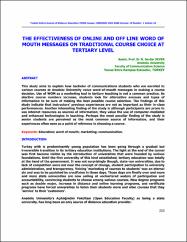| dc.contributor.author | Sever, Serdar N. | |
| dc.date.accessioned | 2019-10-21T19:43:15Z | |
| dc.date.available | 2019-10-21T19:43:15Z | |
| dc.date.issued | 2009 | |
| dc.identifier.uri | http://www.trdizin.gov.tr/publication/paper/detail/TVRBeE1qVTNOdz09 | |
| dc.identifier.uri | https://hdl.handle.net/11421/19462 | |
| dc.description.abstract | This study aims to explain how bachelor of communications students who are enrolled to various courses at Anadolu University value word-of-mouth messages in making a course decision. Use of WOM as a marketing tool in tertiary teaching is not a common practice. As elective course numbers increase, students look for alternative avenues and types of information to be sure of making the best possible course selection. The findings of this study indicate that instructors' previous experiences are not as important as their in-class performances. Another interesting finding of the study is although participants are prone to use internet resources as sources of information; they value the use of computer-mediated and enhanced technologies in teaching. Perhaps the most peculiar finding of the study is senior students are perceived as the most common source of information, and their experiences often seen as a point of reference in choosing a course. | en_US |
| dc.description.abstract | This study aims to explain how bachelor of communications students who are enrolled to various courses at Anadolu University value word-of-mouth messages in making a course decision. Use of WOM as a marketing tool in tertiary teaching is not a common practice. As elective course numbers increase, students look for alternative avenues and types of information to be sure of making the best possible course selection. The findings of this study indicate that instructors' previous experiences are not as important as their in-class performances. Another interesting finding of the study is although participants are prone to use internet resources as sources of information; they value the use of computer-mediated and enhanced technologies in teaching. Perhaps the most peculiar finding of the study is senior students are perceived as the most common source of information, and their experiences often seen as a point of reference in choosing a course. | en_US |
| dc.language.iso | eng | en_US |
| dc.rights | info:eu-repo/semantics/openAccess | en_US |
| dc.subject | Eğitim | en_US |
| dc.subject | Eğitim Araştırmaları | en_US |
| dc.title | The effectivenes of online and off line word of mouth messages on traditional course choice at tertiary level | en_US |
| dc.type | article | en_US |
| dc.relation.journal | The Turkish Online Journal of Distance Education | en_US |
| dc.contributor.department | Anadolu Üniversitesi, İletişim Bilimleri Fakültesi | en_US |
| dc.identifier.volume | 10 | en_US |
| dc.identifier.issue | 1 | en_US |
| dc.identifier.startpage | 210 | en_US |
| dc.identifier.endpage | 222 | en_US |
| dc.relation.publicationcategory | Makale - Ulusal Hakemli Dergi - Kurum Öğretim Elemanı | en_US] |


















